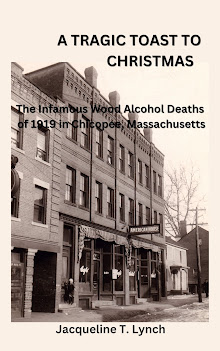Friday, May 28, 2010
"Taps" - Memorial Day
Here’s a high school band student about to play “Taps” on his trumpet at a Memorial Day service at the Quabbin Park Cemetery in Ware, Massachusetts.
We think of the Civil War era as a more romantic age, but the following poem by Walt Whitman shows us that beyond Victorian sentiment, there lay a cold realization of the horror and cost of war. “Taps”, like Memorial Day, was a legacy of that war.
“Come Up from the Fields, Father”
By Walt Whitman
Come up from the fields, father, here's a letter from our Pete,
And come to the front door, mother, here's
a letter from thy dear son.
Lo, 'tis autumn,
Lo, where the trees, deeper green, yellower and redder,
Cool and sweeten Ohio's villages with leaves
fluttering in the moderate wind,
Where apples ripe in the orchards hang and
grapes on the trellis'd vines,
(Smell you the smell of the grapes on the vines?
Smell you the buckwheat where the bees were lately buzzing?)
Above all, lo, the sky so calm, so transparent
after the rain, and with wondrous clouds,
Below too, all calm, all vital and beautiful,
and the farm prospers well.
Down in the fields all prospers well,
But now from the fields come, father, come
at the daughter's call,
And come to the entry, mother, to the front door come right away.
Fast as she can she hurries, something ominous,
her steps trembling,
She does not tarry to smooth her hair nor
adjust her cap.
Open the envelope quickly,
0 this is not our son's writing, yet his name
is sign'd,
0 a strange hand writes for our dear son,
0 stricken mother's soul!
All swims before her eyes, flashes with black,
she catches the main words only,
Sentences broken, gunshot wound in the breast,
cavalry skirmish, taken to hospital,
At present low, but will soon be better.
Ah, now the single figure to me,
Amid all teeming and wealthy Ohio with all
its cities and farms,
Sickly white in the face and dull in the head,
very faint,
By the jamb of a door leans.
Grieve not so, dear mother (the just-grown
daughter speaks through her sobs,
The little sisters huddle around speechless and
dismay'd),
See, dearest mother, the letter says Pete will
soon be better.
Alas, poor boy, he will never be better (nor maybe
needs to be better, that brave and simple soul),
While they stand at home at the door he is
dead already,
The only son is dead.
But the mother needs to be better,
She with thin form presently drest in black,
By day her meals untouch'd, then at night
fitfully sleeping, often waking,
In the midnight waking, weeping, longing with
one deep longing,
0 that she might withdraw unnoticed, silent
from life escape and withdraw,
To follow, to seek, to be with her dear dead
son.
We think of the Civil War era as a more romantic age, but the following poem by Walt Whitman shows us that beyond Victorian sentiment, there lay a cold realization of the horror and cost of war. “Taps”, like Memorial Day, was a legacy of that war.
“Come Up from the Fields, Father”
By Walt Whitman
Come up from the fields, father, here's a letter from our Pete,
And come to the front door, mother, here's
a letter from thy dear son.
Lo, 'tis autumn,
Lo, where the trees, deeper green, yellower and redder,
Cool and sweeten Ohio's villages with leaves
fluttering in the moderate wind,
Where apples ripe in the orchards hang and
grapes on the trellis'd vines,
(Smell you the smell of the grapes on the vines?
Smell you the buckwheat where the bees were lately buzzing?)
Above all, lo, the sky so calm, so transparent
after the rain, and with wondrous clouds,
Below too, all calm, all vital and beautiful,
and the farm prospers well.
Down in the fields all prospers well,
But now from the fields come, father, come
at the daughter's call,
And come to the entry, mother, to the front door come right away.
Fast as she can she hurries, something ominous,
her steps trembling,
She does not tarry to smooth her hair nor
adjust her cap.
Open the envelope quickly,
0 this is not our son's writing, yet his name
is sign'd,
0 a strange hand writes for our dear son,
0 stricken mother's soul!
All swims before her eyes, flashes with black,
she catches the main words only,
Sentences broken, gunshot wound in the breast,
cavalry skirmish, taken to hospital,
At present low, but will soon be better.
Ah, now the single figure to me,
Amid all teeming and wealthy Ohio with all
its cities and farms,
Sickly white in the face and dull in the head,
very faint,
By the jamb of a door leans.
Grieve not so, dear mother (the just-grown
daughter speaks through her sobs,
The little sisters huddle around speechless and
dismay'd),
See, dearest mother, the letter says Pete will
soon be better.
Alas, poor boy, he will never be better (nor maybe
needs to be better, that brave and simple soul),
While they stand at home at the door he is
dead already,
The only son is dead.
But the mother needs to be better,
She with thin form presently drest in black,
By day her meals untouch'd, then at night
fitfully sleeping, often waking,
In the midnight waking, weeping, longing with
one deep longing,
0 that she might withdraw unnoticed, silent
from life escape and withdraw,
To follow, to seek, to be with her dear dead
son.
Posted by
Jacqueline T. Lynch
at
7:37 AM
![]()
Labels: 19th century, Civil War, literature, Massachusetts
Subscribe to:
Post Comments (Atom)










No comments:
Post a Comment